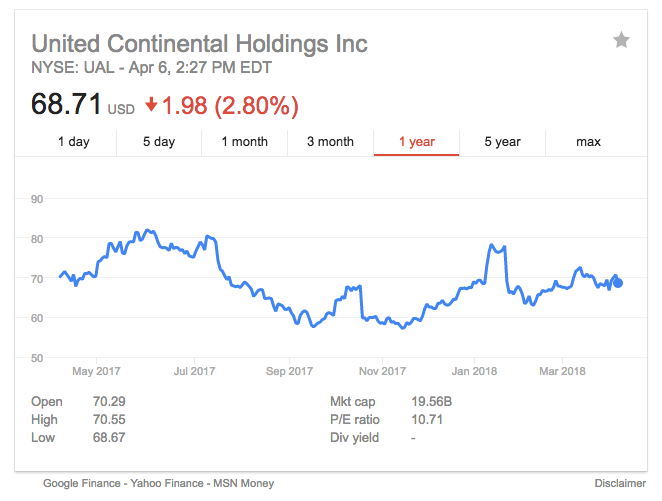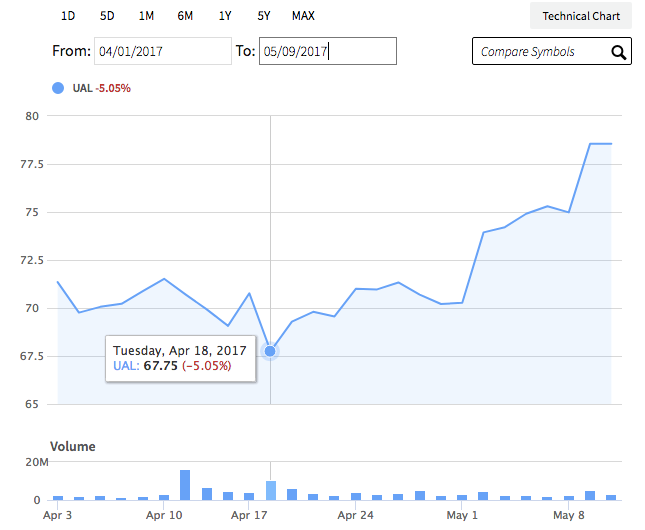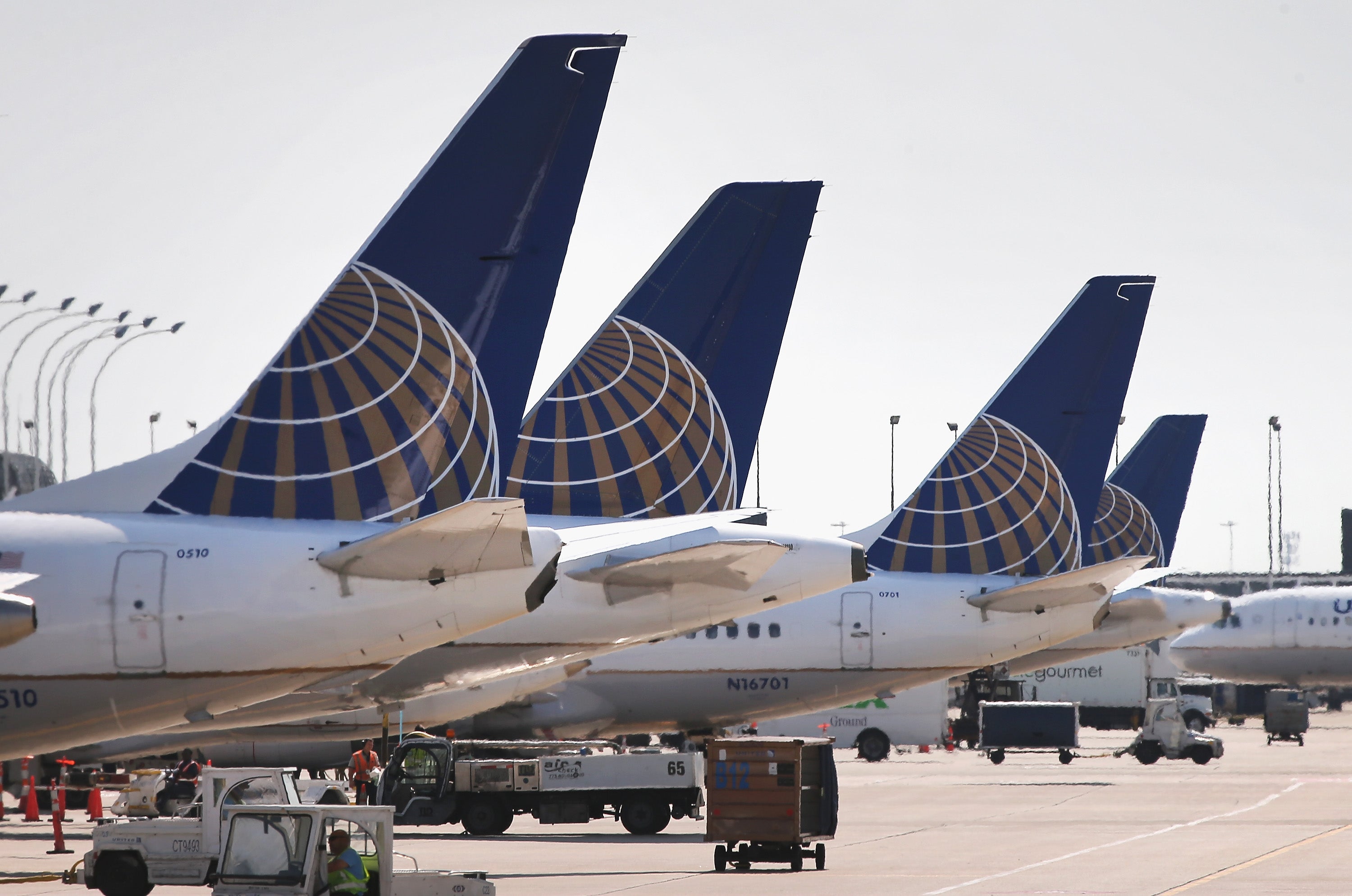United Airlines' #BumpGate: One Year Later
A year ago today, United Airlines made headlines for all the wrong reasons: Due to a last-minute overbooking, the airline had to bump four passengers on Flight 3411 between Chicago O'Hare (ORD) and Louisville, KY (SDF). Dr. David Dao refused to give up his seat, and the rest was unfortunate viral history: Airport security forcibly removed Dr. Dao, leaving the 69-year-old pulmonologist with a broken nose, two missing front teeth and a concussion after his head struck an armrest in the fracas.
TPG extensively covered #BumpGate and its aftermath, including TPG's personal take and later amendment; the airline's initial statement and later apology; United CEO Oscar Muñoz's statements, which most likely cost him a chairman seat after he initially called the passenger "disruptive" and "belligerent"; a senator's legislative proposal to avoid future incidents; an officer's perspective; the legal settlement between the airline and the passenger; how the airline's overbooking policy has changed post-#BumpGate; and the firing of the officers who caused Dr. Dao's injuries.
Now, 365 days later, we're returning to examine how the incident has shaped United Airlines' policies and culture. How did the incident affect United's perception amongst the general public? How about the airline's bottom line? And what do industry experts have to say?
As for United Airlines' stock valuations, the airline's value has held surprisingly steady over the past year. Despite pundit Marlene Downs' scathing opinion last April that the damage to United's reputation would be "lasting and irreparable," the financials hardly back that up.

Specific to the #BumpGate incident, stocks hardly seemed affected, with the sharpest dip following the confrontation occurring well over a week after the fact, on April 18. The airline's quick resolution in settling with Dr. Dao and avoiding litigation led to a very smooth stockholder meeting in May, where the Chicago Tribune reported that not a single shareholder asked about the incident.

In fact, United's largest stock drops occurred in September and November 2017, with a similar dip occurring mid-February 2018, none of which correlate with either the Dr. Dao fiasco, or other incidents involving pets, children, etc.
Dr. Bijan Vasigh, an aviation management professor at Embry-Riddle Aeronautical University, said that the steadiness of United's stock value does not surprise him.
Drawing the distinction between Dr. Dao's mismanaged treatment, and the practice of overbooking, Vasigh said "the bad publicity [around Dr. Dao] created an impetus for airlines to recognize their issues with overbooking."
Yet the practice is a necessity from a financial standpoint in the commercial aviation industry, Vasigh said, where airlines depend on overbooking to protect their bottom line. According to Vasigh, 7-8% of passengers are no-shows "for a lot of reasons," including connecting flight delays, making it extremely difficult for airlines to hit their revenue targets without overbooking each flight. "It's a very careful calculation to strike the right balance."

Despite the negative press, Vasigh said he felt United Airlines made the right call from a public relations standpoint, managing to reach a settlement agreement with Dr. Dao within a few short weeks of the incident, keeping the case far away from litigation.
As for United's CEO, Vasigh said that, in true professor form, he gives Muñoz a "passing grade." There are a "million moving parts" behind the logistics of keeping such a behemoth of a company functioning on the exacting timetables that air travel calls for, he said. "It's a giant ship, with many moving parts," and while each individual incident is "very sad," the airline is doing a good job overall from a statistical standpoint, Vasigh said.
As far as avoiding future fiascos between airline and passengers, Vasigh referenced another airline as a potential role model: Southwest. "[Southwest] has done a wonderful job empowering its employees," he said, "Their employees are happy, and so then their passengers are happy. It all starts from company culture."
So, given the damning situation surrounding Dr. Dao's ordeal, what can — and has — United Airlines done to ensure no passenger ever has to endure such an experience again? For starters, the airline has implemented a 10-step plan to address the issues that arose during #BumpGate:
1. United will not ask law enforcement officers to remove customers from flights unless it is a matter of safety and security.
2. United will not require customers already seated on the plane to give up their seat involuntarily unless safety or security is at risk.
3. United increased customer compensation incentives for voluntary denied boarding up to $10,000. (We recently saw this in action when United offered one customer a $10,000 travel voucher for being bumped from a flight in March 2018.)
4. United established a team to help gate agents use creative solutions to get customers and crews to their final destinations. The team is empowered to bring in separate aircraft, swap in larger aircraft or to offer ground transportation alternatives and compensation choices for customers who prefer to take those options depending on their flexibility.
5. United will book crewmembers onto flights at least 60 minutes prior to departure.
6. In August 2017, the airline began offering Core4 training to make their frontline employees more "Safe, Caring, Dependable and Efficient" — the four core values. (Unfortunately, the announcement for this training came alongside the early Q1 2018 news that quarterly bonuses for employees were on the chopping block.)
7. Beginning in winter of 2017, United introduced a new automated check-in process, both at the airport and via the United app, that gauges a customer's interest in giving up his or her seat on overbooked flights in exchange for compensation. If selected, that customer receives their requested compensation and is booked on a later United flight.
8. United will reduce its practice of overbooking. After making several adjustments, the airline announced that it has reduced involuntary denied boardings (IDBs) by 94% since May 1, 2017.
9. United will empower employees to resolve customer service issues "in the moment." Introduced last year, United launched a new app for employees to handle customer issues as they arise.
10. In June 2017, United adopted a new no-questions-asked policy on permanently lost bags, where United will pay a customer $1,500 for the value of the bag and its contents.
"Flight 3411 was a defining moment for United Airlines," said Charles Hobart, a spokesperson for United Airlines. "It is our responsibility — our mission — to make sure we as a company and all of our 90,000 employees learn from that experience. ... We have taken additional steps to put the customer at the center of everything that we do, signaling a culture shift toward becoming a better, more customer-focused airline."
Overall, the numbers suggest that United may be doing a better job on some fronts than most of us give credit for. (For instance, despite all the recent dog-related incidents from the past few months, one TPG staffer found that United Airlines is the only carrier that permits short-nosed dogs onboard, which means the airline statistically transports far more pets than other carriers.)
TPG CEO Brian Kelly believes Dr. Dao's unfortunate experience was the final straw in shifting the balance of power from airlines to customers. "The power of the consumer to rise up and demand the respect to be treated like a human — I think that message got across," he said.
Our TPG lounge reader input varied across the spectrum, with more than 380 people at the time of this post saying that their opinions of United Airlines had stayed the same over the past year. Over 300 readers stated that their perception of the carrier had taken a turn for the worse, with just a handful of readers saying that they had developed more confidence in the airline in the year that's passed.
TPG reader Adam Thompson commented, "I form my opinions about a company based mostly on how they treat me and my friends, not what gets reported in the news. News items, good or bad, tend to paint an inaccurate picture. United has treated me reasonably well, so I'll continue to fly them when they're the best option."
All things considered, life has carried on for United Airlines post-#BumpGate. It's heartening to see that the airline has made an effort to improve passenger morale, despite the lack of financial necessity. While United may never bask in the same kind of customer love that, say, Southwest Airlines inspires, it's nice to see the newer policies beginning to come into effect, as evidenced by a growing number of passengers who have received increasingly generous travel vouchers in exchange for voluntarily giving up their seats.
TPG featured card
at Capital One's secure site
Terms & restrictions apply. See rates & fees.
| 5X miles | Earn 5X miles on hotels, vacation rentals and rental cars booked through Capital One Travel |
| 2X miles | Earn unlimited 2X miles on every purchase, every day |
Pros
- Stellar welcome offer of 75,000 miles after spending $4,000 on purchases in the first three months from account opening. Plus, a $250 Capital One Travel credit to use in your first cardholder year upon account opening.
- You'll earn 2 miles per dollar on every purchase, which means you won't have to worry about memorizing bonus categories
- Rewards are versatile and can be redeemed for a statement credit or transferred to Capital One’s transfer partners
Cons
- Highest bonus-earning categories only on travel booked via Capital One Travel
- LIMITED-TIME OFFER: Enjoy $250 to use on Capital One Travel in your first cardholder year, plus earn 75,000 bonus miles once you spend $4,000 on purchases within the first 3 months from account opening - that’s equal to $1,000 in travel
- Earn unlimited 2X miles on every purchase, every day
- Earn 5X miles on hotels, vacation rentals and rental cars booked through Capital One Travel
- Miles won't expire for the life of the account and there's no limit to how many you can earn
- Receive up to a $120 credit for Global Entry or TSA PreCheck®
- Use your miles to get reimbursed for any travel purchase—or redeem by booking a trip through Capital One Travel
- Enjoy a $50 experience credit and other premium benefits with every hotel and vacation rental booked from the Lifestyle Collection
- Transfer your miles to your choice of 15+ travel loyalty programs
- Top rated mobile app


